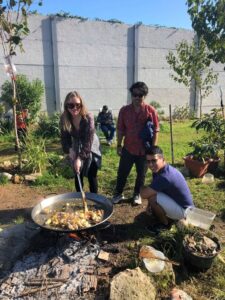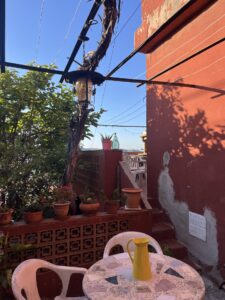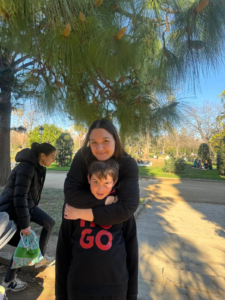Some people say it is impossible to successfully be vegetarian in Spain. I can tell you now: that’s not true. The Mediterranean diet is mainly based on fruits, vegetables, whole grains and olive oil. Sardines and blue fish as well, that’s right. But you can skip it and still enjoy the rest of the Mediterranean diet. So, I’m highlighting this: being vegetarian in Spain is not only possible, but super easy and delicious! Here are 4 important lessons on how to be vegetarian in Spain.
Lesson One: Café Andaluz in Glasgow is not an Accurate Representation of a Typical Spanish Café
I came to Spain imagining every café to have a menu full of wonderful offerings of patatas bravas, padrones, berenjenas and all sorts of unique vegetable-based dishes. This was not the case. Depending on the region of Spain that you visit, you can find vegetarian Mediterranean diet or… a diet based on pork. In the central regions of the peninsula, the main ingredient in most dishes is pork, beef or chicken. If you are lucky enough to live near the coast, you’ll find seafood sneaking into almost everything. If you’ve ever been duped by a seemingly innocent vegetal bocadillo, you’ll know what I’m on about.
However, having spent three months in Palma de Mallorca, where it is considered a mark of quality to have a spliced leg of local jamón hanging above the bar, I can safely say that as a vegetarian in Spain you will not starve on social occasions. In fact, I challenge you to become an expert on your local veggie fare and report back to me so I can come and try it all for myself!

I hope I can challenge any ideas you might have come across that Spain is inhospitable to vegetarians, and that these tips will come in handy for making your Spanish adventure a well-fed and happy one!
Lesson Two: Quality Over Quantity
You might not have much choice when you go out to eat at a traditional restaurant. But the lack of choice will make you more adventurous. You order the one veggie dish on the menu that you’ve never heard of and would otherwise forsake for a more familiar option. My boldness has led me to discover some interesting and wonderful flavours, which I would never have encountered had I not been a hungry and choice-strapped vegetarian. Be brave, experiment and soon you’ll become a connoisseur of the veggie delicacies in your area.
Being a Vegetarian in Spain is a delicious adventure
Coca de trampó (NOT pizza- calling it this results in a withering look from the locals) is a flatbread with the texture of shortcrust pastry topped with tomato, onions, and peppers. The topping originates from the simple and abundant ingredients available in Mallorca’s long gone days, where pastoral and horticultural agriculture were the staple livelihoods of its people. Quality ranges quite unexpectedly, from thicker dough to exotic barbeque flavoured toppings to soggy bottoms (I’m looking at you, El Corte Inglés). The best I had was from a market in beautiful Valdemossa, where the bread was thin and crispy and the toppings plentiful.
Tumbet, meanwhile, is made up of fried vegetables and potatoes covered with a lovely rich garlicky tomato sauce. It is really tasty and can be made with different vegetables but usually involves aubergine, red pepper, and onion. It is served in traditional restaurants and is a great way to fill up after a long day of exploring. I would also recommend sampling different bars to find some veggie pintxos, slices of baguette topped with all sorts of vegetables, cheeses, and even guacamole. And of course, there’s always tortilla!
Lesson Three: Spanish People Take Pride in Fresh, Local Ingredients Prepared with Love
And quite rightly. In Mallorca and much of mainland Spain, the traditional breakfast consists of toasted white bread topped with olive oil, salt, pepper, and tomatoes. This isn’t a traditional breakfast in the British sense, where fat laden fry ups are touted to tourists as a must have while we go for the more health friendly toast or porridge. Every café you zoom past on your daily route to work will offer some version of tostadas, usually served with coffee or juice for a very reasonable 2 euros or so.

In the last couple of months, I regularly buy a fresh baguette from the little bakery on my street and top it with Mallorca’s famously delicious olive oil and ripe tomatoes before toasting it in the oven and munching it with giddy satisfaction. I am fortunate enough to live in the middle of the Mediterranean and have access to this sunshine-flavoured deliciousness every day. But enough boasting. Now, I must tell you about the wonderful welcoming kindness (and tasty, tasty paella) I encountered at the birthday party.
Lesson Four: Ask!
Spaniards may not share your herbivorous lifestyle, but if you share their enthusiasm for the best quality home-grown ingredients most of them will happily provide you a marvelously meatless meal.
A few weeks ago, I was invited to an afternoon paella cookout in a local allotment garden that was celebrating its 11th birthday. At midday, I cycled over with a bottle of Don Simón sangria, watching sunbeams flickering through the buildings and branches overhead and wishing I hadn’t brought my heavy leather jacket. I walked through the tall gates and left my bike beside a twisted old tree. About 10 people were there already, busy gathering vegetables and wood and chatting beneath the bright blue sky.
First, a tour of the garden, where vegetables and fruits and herbs grew harmoniously alongside one another and the smell of earth and wood smoke drifted through the air. Then, a glass of wine and an introduction to the allotments’ current gardeners. They were more than happy to have some new faces around for their garden’s birthday bash. My friend mentioned that some of us were vegetarian. No sooner said than done, there was a separate pan brought out and a veggie paella underway.
Lost in the beauty of the garden, I suddenly noticed that there were now thirty or forty people there. A row or trestle tables had been set up and as people arrived they placed glorious offerings of coca, tortilla, bread, pastries and creamy and chocolaty cakes for pudding, which we sangria touting chancers delved into with glee. There were so many tortillas we had a tortilla judging in which it was concluded that one’s tortilla preferences came down to the firmness or gooieness of the tortilla. Team gooey anyone?
Paella Time!

Then the paella. The biggest pan I have ever seen was placed on top of a small fire and coated in a good slick of olive oil, which Mallorca is famous for. All sorts of freshly picked vegetables including peppers, green beans, onions, mushrooms, and garlic. Plus, tomatoes were added one by one, with green leafy herbs and saffron and rice.
We took turns stirring the paella -harder than it looks-, stoking the fire and gazing hypnotically as the ingredients sizzled and were stirred slowly and steadily round the huge pot. It was a team effort. At any one time, there were at least three people attending the great beast. When it was time to eat, everyone gathered round the two huge dishes of paella- one fishy and one veggie- and took a big spoonful and sat at the trestle tables. Then we ate all together under the warm November sun. It was perfect, every bite full of the flavour of something that was still part of the earth just this morning.
I went home that day with a big smile and a newfound appreciation for the sense of community centered around the garden, built on a shared attitude of kindness, patience, co-operation and a strong appreciation for the land and its produce. Moreover, I felt content knowing that lots of people shared my love for vegetables. They were kind enough to include me in their garden’s birthday celebrations.
I hope this post has made you feel more hopeful about finding great veggie food in Spain. Most of all, I hope that by sharing my adventures I might just inspire you to come and try it for yourself!












12 Responses
This is so helpful!! I’m not a vegetarian but there are definitely some amazing fruits and vegetable options! I live in Murcia now and I’m so lucky because it’s known for being the Huerta of Spain!! We even have week long festivities to celebrate fruits and vegetables. The tomatoes are the best I’ve ever had in the whole world and will miss them very much when I return to the US.
This is brilliant! Although not a vegetarian, three of my closest friends living in Spain are, and so I’m familiar with what they do to eat well while over here – it definitely takes a little bit of trial and error, but what you mention about the food in Spain being so fresh, and the people taking such pride is so true, and for sure getting inventive and cooking your own dishes ensures that you can get whatever you’d like to eat…and for cheap as well!
Not a vegetarian, but I have a close friend here who is. She definitely uses lesson four of asking what is vegetarian whenever we go to a restaurant. Be sure to ask because even if the menu lists only vegetables in a dish, often fish or meat will be thrown into dishes so it’s good to double check before assuming! But I agree that you can find vegetarian options here.
I’m not a vegetarian either, but I constantly find myself being pulled toward the vegetarian dishes! My absolute favorite is tortilla (con cebolla, please), and just the other day my host mom made us typical coca like from Mallorca, which was delicious. It’s a great point that you made about being challenged to try new things. I ought to try that, too!
Although I am not a vegetarian, I have LOVED trying different vegetarian and vegan restaurants and dishes throughout my year here in Spain. I definitely agree about asking before ordering. Sometimes things that may appear to be vegetarian have been cooked in chicken broth, so it is always better to be sure. Murcia, the city where I live, has a whole section of the city dedicated to vegetarian and vegan restaurants and those have become some of my favorite restaurants to eat at! It is definitely easy to enjoy the veggie lifestyle with all the fresh, delicious food Spain has to offer!
I’m not a vegetarian but these are great tips! For meat lovers, Spain is amazing when it comes carne 😉 Many dishes have chicken and beef, but the most popular are pork and seafood. Living in Murcia right by the coast, many of our dishes have some sort of seafood. The jamon is to die for here. I’ll admit when I first tried it, I wasn’t the biggest fan, but over the months, I’ve grown to become addicted to it!! Seafood is so fresh and I know that when I return back to the US, I will be incorporating fish a lot more into my meals. One famous and delicious dish in Murcia (that is vegetarian) is ensalada Murciana which is a mixture of hard-boiled eggs, a tomato paste/sauce, and some garlic and onions.
This is great, I wish I’d have saw this article before I moved here! I found it really difficult last year in the north (I was a vegetarian for years before I moved to Spain too!) but maybe had I had this inspiration and felt I could still embrace the culture like this, I may still be meat free! Maybe I’ll give it another go 🙂
My roommate is a vegan and here in Barcelona, although people think its impossible, it’s actually really doable!
There are lots of different options for restaurants and local fresh fruit and veggies make it pretty easy- especially being so cheap compared to the US.
I am vegetarian and living in Spain, so these tips are really handy for me. Its actually not so hard to be vegetarian here.
One of my close friends here in Spain is vegetarian and it definitely can be a challenge! I totally agree with the idea that you have to go outside your comfort zone and open yourself up to new flavors and ingredients when living in a country that is not extremely vegetarian-friendly! ????
I’ve noticed many organic and vegetarian cafes and restaurants in my city, Gijon. Even though I’m not vegetarian, I enjoy trying them out when I’m tired of typical Spanish food.
I can relate to these tips so much – I’m also a vegetarian living in Spain, Andalucia nonetheless! I’ve definitely learned to ask and communicate at restaurants, usually they’re willing to take off a piece of jamon or fish from your order! I can definitely say I’ve had my fair share of tortilla here haha! Thanks for sharing!